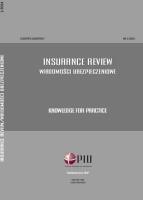How far shall the protection of a traffic accident victim go under motor third party liability insurance?
How far shall the protection of a traffic accident victim go under motor third party liability insurance?
Author(s): Jakub PokrzywniakSubject(s): Law, Constitution, Jurisprudence
Published by: Polska Izba Ubezpieczeń
Keywords: Motor third party liability insurance; exclusions of liability; fraud; preliminary ruling
Summary/Abstract: This paper was inspired by a recent reference for a preliminary ruling lodged by the French Cour de Cassation (Mutuelle assurance des travailleurs mutualistes (Matmut) v TN and Others, Case C-236/23). The Cour de Cassation asked whether ‘Articles 3 and 13 of Directive 2009/103 of the European Parliament and of the Council of 16 September 2009 must be interpreted as precluding the nullity of a contract for civil liability motor insur- ance from being declared enforceable against a passenger who is a victim where that person is also the poli- cyholder and intentionally made a false statement at the time of conclusion of the contract which gave rise to that nullity’. The Cour de Cassation observed that the CJEU had never ruled whether the nullity of the contract can be relied on against a victim who was a passenger in the vehicle where the victim is also the policyholder and the person who made the intentional false statement, which resulted in the insurance contract being null and void under national law. None of the judgments delivered by the CJEU relate to that specific situation. Even though the Court has been strengthening the rights of victims of traffic accidents for many years, by applying a rigorous interpretation of the provisions of the motor insurance directives precluding national rules that would allow for the avoidance of a policy response towards a passenger beyond the scope of the exclusions expressly allowed in the directives, some questions remain. In this case, we are dealing with an obvious insurance fraud committed by a person who subsequently suffered injuries in an accident caused by a driver of the vehicle for which a policy had been taken out by the injured person being at the same time a policyholder. Should the EU law protect also those persons who are clearly attempting to misuse an insurance contract? Shall we slur over the fact that by its nature an insurance contract has always been based on mutual trust (uberrimae fidei contract)? Should the rules governing motor third party liability insurance go as far as in no other insurance? Do fraudsters deserve protection?
Journal: Wiadomości Ubezpieczeniowe
- Issue Year: 2024
- Issue No: 1
- Page Range: 21-32
- Page Count: 11
- Language: English

